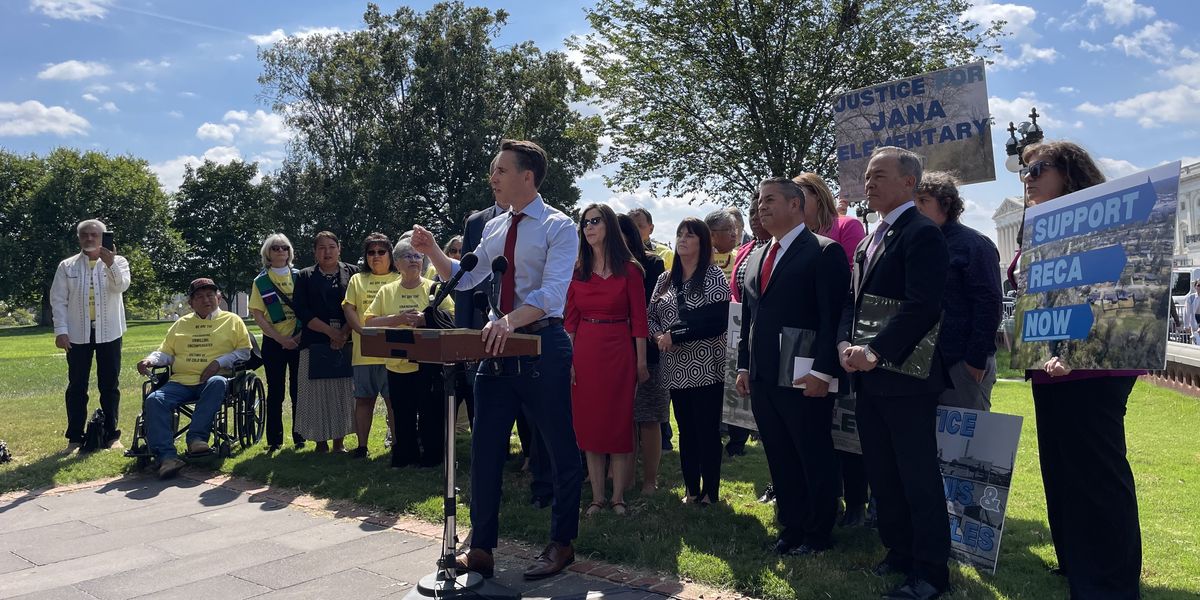A bipartisan group of lawmakers pledged Tuesday that they would fight to get compensation for American who have been harmed by radioactive fallout from nuclear testing and mining operations.
“If the government is going to expose its own citizens to radioactive material for decades, the government ought to pay the bills of the men and women who have gotten sick because of it,” said Sen. Josh Hawley (R-Mo.) in a press conference near the Capitol. “They ought to pay for the survivor benefits of those who have been lost.”
Hawley’s comments came just a few months after he surprised observers by introducing an amendment to the National Defense Authorization Act (NDAA) to expand compensation for victims of nuclear testing. The proposal earned bipartisan support following intensive lobbying by Hawley and Sen. Ben Ray Lujan (D-N.M.), allowing the measure to pass on a 61-37 vote.
The House, which did not include such a measure in its version of the NDAA, voted yesterday to send its text of the defense policy bill to conference, where the Biden administration plans to work with leadership from each chamber to reconcile the two bills.
While some House Republicans have opposed the bill due to potential costs, Hawley says he is “hopeful” that he will persuade his colleagues to support the measure. “I’m talking to anybody who will listen,” he told reporters. “Congress can actually get something done, and we can work across the aisle.”
Reps. Teresa Leger-Fernandez (D-N.M.) and James Moylan (R-Guam), both of whom have numerous constituents affected by nuclear testing, are leading a push in the House to build support for the measure.
The proposal builds on the Radiation Exposure Compensation Act, which passed in 1990 and was expanded in 2000. The law provides compensation for some uranium miners and “downwinders” who lived near the Nevada Test Site, where the U.S. government conducted hundreds of nuclear tests in the 1950s and 1960s.
But it left out a number of groups that have faced increased rates of cancer and other deadly or debilitating diseases, including those who lived downwind of J. Robert Oppenheimer’s “Trinity Test” in New Mexico.
Downwinders have struggled for years to get the government to recognize the harm it caused them. Activists have lobbied lawmakers, held vigils for victims, and even attempted to get the team producing 'Oppenheimer' to include a note about their plight in the blockbuster biopic.
While Christopher Nolan's crew never took a meeting with the downwinders, his film has helped move their efforts forward, according to Lujan, a long-time supporter of RECA expansion who attributes his father’s untimely death to radiation exposure while working at Los Alamos.
“I’m happy that story is being told because it’s given an opportunity for all the families behind me here and countless others to shed light on an injustice,” he said, gesturing to a group of more than 20 activists from areas not covered under RECA.
If passed, the expansion would also extend the program, which is set to expire next summer, for an additional 19 years. Activists say this is key given that many downwinders and uranium miners may not be aware of the ties between nuclear testing and cancer. Bernice Gutierrez told RS that she only made the connection between radiation and her family's health issues — including 21 separate cases of cancer — in the early 2000s, when she saw an activist speaking about the issue on local television.
“It’s the first time that we have ever come this close,” Gutierrez told RS, holding back tears. “We just hope it goes all the way.”
“It should not be a hard decision,” she added. “Our country harmed us, and our country should make it right.”
Some of the harm related to nuclear testing is ongoing. As an activist from St. Louis told reporters, the military has removed at least 300 truckloads of nuclear waste from a site near a St. Louis elementary school over the last few months. The impact of that radioactive material will take years to fully grasp.
Tina Cordova, an activist from New Mexico who survived a bout with thyroid cancer when she was 39, said she is determined to fight for RECA expansion even if the measure fails to make it into the NDAA this year. “We will never go away,” she told reporters. “There are generations standing behind us whose genes carry this legacy.”
- 'Downwinders' ignored despite radiation fallout from US nuke tests ›
- Oppenheimer and the birth of the nuclear-industrial complex ›
- What ‘Oppenheimer’ leaves out ›














